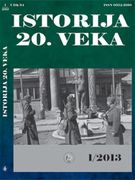Progon Srba iz Zagreba i oduzimanje srpske imovine 1941. godine
Expulsion Of Serbs From Zagreb And Confiscation Of Their Property In 1941
Author(s): Filip ŠkilјanSubject(s): History
Published by: Institut za noviju istoriju Srbije
Keywords: World War II; 1941; Serbs; Independent State of Croatia; Zagreb; concentration camps
Summary/Abstract: The Orthodox population of Zagreb numbered 13 279 people (7.2%) according to the census of 1931. In the first period after the founding of the Independent State of Croatia, the Ustaša regime wanted to take revenge on all „enemies” who in any way took part in or supported the former monarchist regime and were „enemies of the Croatian people”. The first to be persecuted by the Ustaša regime were the Serbs. The actual preparations to expel the Serbs from Zagreb were made after passing Legislative provisions for the protection of people and state, legislative provisions banning the use of Cyrillic alphabet, legislative provisions on converting from one religion to another and use of hate speech that was so widespread in the media and public Ustaša assemblies. The preparations were arranged with the representatives of the German authorities in June. Ustaša authorities made a list of Serbs and then the expulsion of 684 people from Zagreb to Serbia was conducted in three waves while 267 people individually left Zagreb for Serbia. Serbs arrested in the first two waves were expelled directly to Serbia, while Serbs who remained for the third wave were deported first to the Caprag camp and then 343 of them to Serbia. A small number of Serbs managed to leave the Caprag camp by submitting pleas. It is evident that this list is not complete and that the number of expelled Serbs was larger. As far as Serbian property is concerned, documents show that it was largely confiscated by the state, however some individuals through business or friendly connections, managed to keep their property. It is not possible to establish the extent of confiscated property, however the government statistics show that at least 95 Serbian companies and 86 Serbian buildings in Zagreb were confiscated.
Journal: ТОКОВИ ИСТОРИЈЕ
- Issue Year: 2013
- Issue No: 1
- Page Range: 85-115
- Page Count: 31
- Language: Serbian

